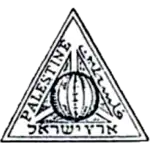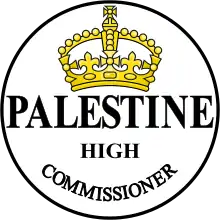Mandatory Palestine national football team
The Mandatory Palestine national football team, also known as the Eretz Israel national football team (Hebrew: נבחרת ארץ ישראל בכדורגל, romanized: Nivheret Eretz Yisrael Bekhadurgel, lit. 'Land of Israel national football team'), represented the British Mandate of Palestine in international football competitions, and was managed by the Palestine Football Association (Hebrew: התאחדות ארץ ישראלית למשחק כדור-רגל, romanized: Hitachduth Eretz Yisraelit Lekhadur Regel, lit. 'The Land of Israel Association of Football').[lower-alpha 1]
| 1934–1940 | ||
|---|---|---|
 | ||
| Nickname(s) | Eretz Israel (Land of Israel) | |
| Association | Palestine Football Association (PFA) | |
| Head coach | Shimon Ratner (1934 WCQ) Egon Pollak (1938 WCQ) Arthur Baar (1940 Friendly) | |
| Captain | Avraham Reznik (1934–1938) Pinhas Fiedler (1934) Gdalyahu Fuchs (1938) Werner Kaspi (1940) | |
| Most caps | Gdalyahu Fuchs (4) | |
| Top scorer | Werner Kaspi (2) | |
| Home stadium | Palms Stadium, Tel Aviv Maccabiah Stadium, Tel Aviv | |
| FIFA code | PAL | |
| ||
| First international | ||
(Cairo, Egypt; 16 March 1934) | ||
| Last international | ||
(Tel Aviv, Mandatory Palestine; 27 April 1940) | ||
| Biggest win | ||
(Tel Aviv, Mandatory Palestine; 27 April 1940) | ||
| Biggest defeat | ||
(Cairo, Egypt; 16 March 1934) | ||
The team was founded in 1928 by Yosef Yekutieli, leader of the Jewish sports organization Maccabi World Union, under the newly-formed "Palestine Football Association", so-named in order to qualify for membership of FIFA (which required teams to be representative of the population of their country). It achieved FIFA membership in 1929, despite in practice being an almost exclusively Jewish organization at a time when Jews represented a small minority of the country's population. In 1934 all Arabs involved in the organization left, as they considered they were being used as a "fig leaf".[2]
The team used to play in the Maccabiah Stadium and Palms Stadium, both located in Tel Aviv. Mandatory Palestine played five official games (four FIFA World Cup qualifiers, and one friendly), before it officially became the national team of Israel in 1948.
History

Football was introduced to Palestine by the British military during its occupation of the territory in World War I. After the war, the sport's development was continued by "European Jews who had been exposed to soccer in their native countries".[1] The Palestine Football Association was founded in August 1928 and applied for membership in FIFA. It was accepted to FIFA on 6 June 1929 as the Palestine Football Association, following an application by the Jewish Maccabi World Union.[3][4] It was the first of 14 sports organizations which absorbed hundreds of leading sportsmen who immigrated in the wake of antisemitism in Europe.[5]
By FIFA rules, the association had to represent all of Palestine's population, and it made formal claims to that effect. In practice, it was dominated by Jewish players and executives, despite Palestinian Arabs forming the majority of the population.[6]
According to Issam Khalidi, "the Jewish leadership" of the association systematically limited Arab participation by ensuring Jewish clubs constituted its majority, imposing Hebrew for official communication, and adding the Zionist flag in its logo.[7] Consequently, the Palestinian Arab players boycotted the national team and, in 1934, the Arab clubs left the association to form the General Palestinian Sports Association.[2][6][lower-alpha 2]
Mandatory Palestine played five international games before the end of the British Mandate in 1948 which resulted in Israel's independence.[9] During those five games, the national team fielded only Jewish players. Three anthems were played before each match: the British "God Save the King", the Jewish (and future Israeli) "Hatikvah" and the opposing team's anthem.[10]
In 1948 the team officially became the national team of Israel.[11]
Players
1934 FIFA World Cup qualification
Coaches: ![]() Egon Pollak and
Egon Pollak and ![]() Shimon Ratner[12]
Shimon Ratner[12]
| No. | Pos. | Player | Date of birth (age) | Club | ||
|---|---|---|---|---|---|---|
| GK | Willy Berger | |||||
| DF | Avraham Reznik | |||||
| DF | Pinhas Fiedler | |||||
| MF | Zalman Friedmann | |||||
| MF | Gdalyahu Fuchs | |||||
| MF | Yohanan Sukenik | |||||
| FW | Amnon Harlap | |||||
| FW | Avraham Nudelman | |||||
| Perry Kraus | ||||||
| Paul Kastenbaum | ||||||
| Haim Reich | ||||||
| David Weinberg | ||||||
| Yaacov Levi-Meir | ||||||
| Yaacov Zelibanski | ||||||
1938 FIFA World Cup qualification
Coach: ![]() Egon Pollak[12]
Egon Pollak[12]
| No. | Pos. | Player | Date of birth (age) | Club | ||
|---|---|---|---|---|---|---|
| 1 | GK | Julius Klein | ||||
| GK | Israel Elsner | |||||
| 2 | DF | Avraham Beit-Halevi | ||||
| 3 | DF | Avraham Reznik (Captain) | ||||
| 4 | MF | Yosef Liebermann | ||||
| 5 | MF | Yohanan Sukenik | ||||
| 6 | MF | Menahem Mirmovich | ||||
| MF | Gdalyahu Fuchs | |||||
| 7 | FW | Shmuel "Mila" Ginzburg | ||||
| 8 | FW | Shuka Brashedski | ||||
| 9 | FW | Peri Neufeld | ||||
| 10 | FW | Gaul Machlis | ||||
| 11 | FW | Avraham Nudelman | ||||
| FW | Yona Stern | |||||
| FW | Jerry Beit-Halevi | |||||
| FW | Nathan Pentzi | |||||
1940 friendly
Coach: ![]() Arthur Baar[12]
Arthur Baar[12]
FIFA World Cup record
| Mandatory Palestine's FIFA World Cup record | Qualification record | ||||||||||||||||
|---|---|---|---|---|---|---|---|---|---|---|---|---|---|---|---|---|---|
| Host nation(s) and year |
Round | Pos | Pld | W | D | L | GF | GA | Squad | Outcome | Pld | W | D | L | GF | GA | |
| Did not participate | Did not participate | ||||||||||||||||
| Did not qualify | 2nd of 2 | 2 | 0 | 0 | 2 | 2 | 11 | ||||||||||
| 2nd of 2 | 2 | 0 | 0 | 2 | 1 | 4 | |||||||||||
| 1950–present | See Israel national football team | See Israel national football team | |||||||||||||||
| Total | Best: N/A | 0/3 | 0 | 0 | 0 | 0 | 0 | 0 | — | Total | 4 | 0 | 0 | 4 | 3 | 15 | |
Results
| 16 March 1934 1934 FIFA World Cup qualification | Egypt | 7–1 | | Cairo, Egypt |
| Report |
|
Stadium: British Army Ground Attendance: 13,000 Referee: Stanley Wells (England) |
| 6 April 1934 1934 FIFA World Cup qualification | Mandatory Palestine | 1–4 | | Tel Aviv, Mandatory Palestine |
|
Report | Stadium: Palms Stadium Attendance: 8,000 Referee: Frederick John Goodsby (England) |
| 22 January 1938 1938 FIFA World Cup qualification | Mandatory Palestine | 1–3 | | Tel Aviv, Mandatory Palestine |
|
Report | Stadium: Maccabiah Stadium Attendance: 8,000 Referee: Mohammed Youssef (Egypt) |
| 20 February 1938 1938 FIFA World Cup qualification | Greece | 1–0 | | Athens, Greece |
| Vikelidis |
Report | Stadium: Stadio Leoforos Alexandras Attendance: 12,000 Referee: Mika Popović (Yugoslavia) |
| 27 April 1940 Friendly | Mandatory Palestine | 5–1 | | Tel Aviv, Mandatory Palestine |
| 16:00 UTC+3 |
|
Report |
|
Stadium: Maccabiah Stadium Attendance: 10,000 Referee: John Blackwell (England) |
See also
Notes
- According to the Israel Football Association, the name of the association was "Eretz Israel Football Association".[1]
- Richard Henshaw's encyclopaedia also noted that "Islamic beliefs throughout the Arab world resisted Western cultural institutions such as soccer until well after World War II, by which time Arab participation in the development of Israeli soccer was nearly impossible."[8]
References
- Henshaw 1979, p. 387.
- Mendel, Yoni (1 May 2015). "The Palestinian soccer league: A microcosm of a national struggle". +972 Magazine. Retrieved 14 May 2020.
The result was the birth of the Palestinian Football Association (PFA) and the launch of the local league. It was not particularly equitable: Nine Jewish clubs and one British club (that of the British police) participated in the champions league, while the Arab clubs played only in the secondary league. Neither was the representation in the federation exceptionally fair: among the 15 members of the federation, 14 were Jewish and only one, the Jerusalemite referee Ibrahim Nusseibeh, was Arab. The inaugural meeting of the PFA, in 1928, was the first and last meeting which Nusseibeh attended. In 1934, in keeping with the prevailing segragationist trends in the country, the Arab football clubs decided they refuse to continue being the fig leaf within the framework of an overwhelmingly Jewish league, and left. A parallel, exclusively Arab football league was established a year later.
- Foundation and Affiliation year in Association Information of Israel at FIFA official website
- Foundation and FIFA affiliation years on association information of Israel at UEFA website
- Griver, Simon (June 1999). "Sports in Israel". Israel Ministry of Foreign Affairs. Archived from the original on 22 June 2013. Retrieved 20 July 2013.
- Sorek 2003, p. 417–437.
- Khalidi, Issam (Spring 2014). "Sports and Aspirations: Football in Palestine, 1900–1948" (PDF). Jerusalem Quarterly (58). pp. 74–89. Retrieved 14 May 2020.
Immediately after being accepted into FIFA, the Jewish leadership of the PFA set about ensuring a majority of Jewish clubs in its membership. The Hebrew language was imposed and the Zionist flag incorporated into the federation’s logo. By 1934, the dominance of Zionist officials meant that Arab clubs had no say in the running of the association, despite Arabs comprising over three-quarters of Palestine’s population.
- Henshaw 1979, p. 386.
- Cazal, Jean-Michel; Bleicher, Yaniv. "British Mandate of Palestine Official Games 1934–1948". RSSSF. Retrieved 20 July 2013.
- Mubarak, Hassanin. "Palestine – International Results – Details". RSSSF. Retrieved 20 July 2013.
- "Statistical Kit: Preliminary Draw for the 2014 FIFA World Cup Brazil" (PDF). The AFC. 28 June 2011. p. 53. Retrieved 21 December 2020.
A Jewish delegation from Palestine (then a British mandate) played at the qualifying games for 1934 & 1938. It was the first Jewish national team, and as such the forerunner of Israel.
- Cazal, Jean-Michel; Bleicher, Yaniv. "British Mandate of Palestine Official Games 1934–1948". RSSSF. Retrieved 14 May 2020.
Bibliography
- Henshaw, Richard (1979). The Encyclopedia of World Soccer. Washington, D.C.: New Republic Books. ISBN 0-915220-34-2.
- Sorek, Tamir (2003). "Palestinian Nationalism Has Left the Field: A Shortened History of Arab Soccer in Israel". International Journal of Middle East Studies. 35 (3): 417–437. doi:10.1017/S0020743803000175. JSTOR 3880202.
